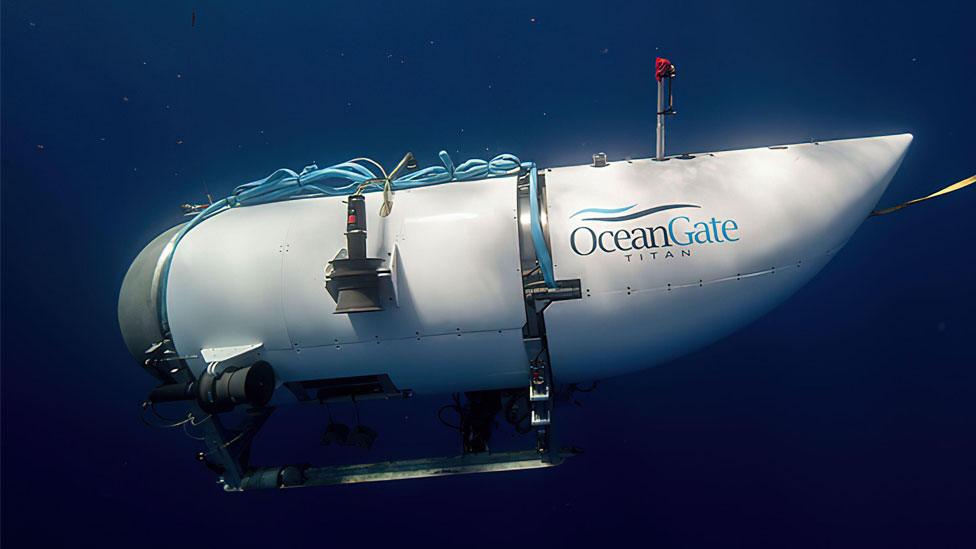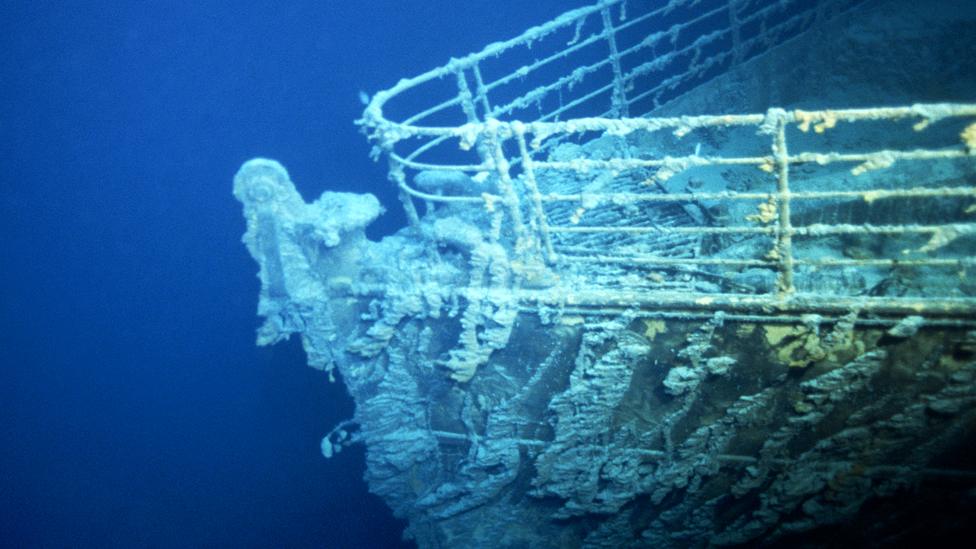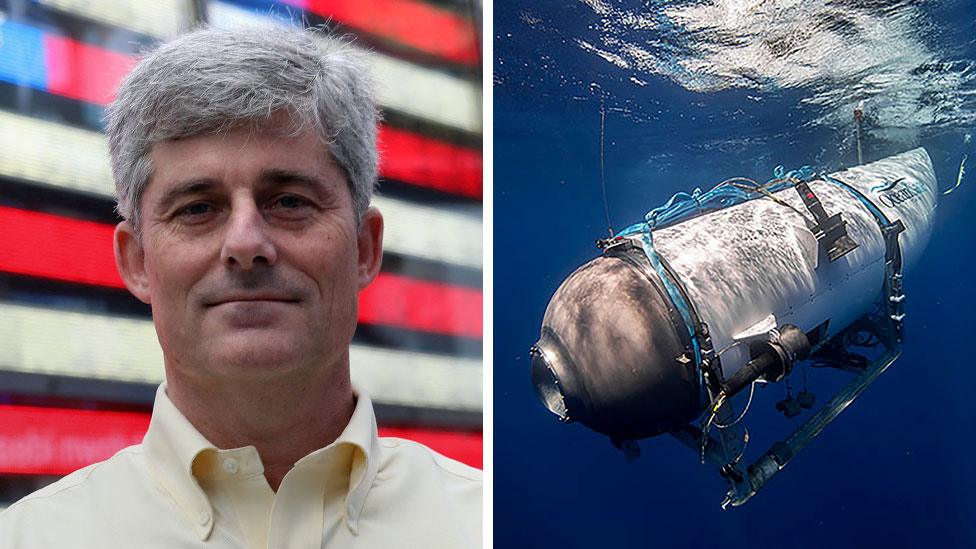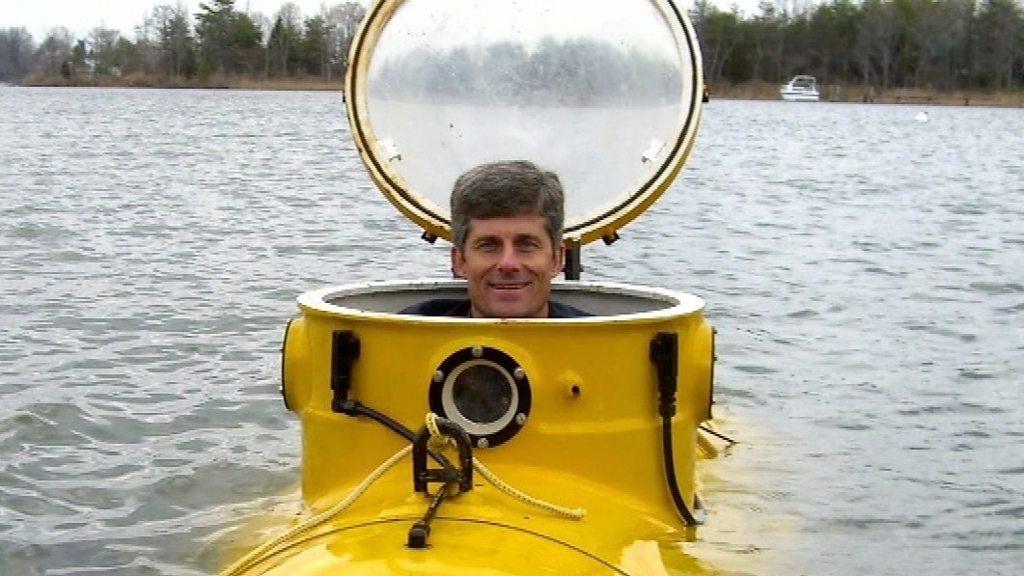Will Titan's loss end dives to Titanic wreck forever?
- Published
Watch: A definitive timeline of the Titan's last moments
Ever since RMS Titanic set sail across the Atlantic Ocean on 10 April 1912, people around the world have been fascinated by the ship and its terrible tragedy.
Its history has inspired a blockbuster film and a thriving tourist industry in Canada, the US, and the UK, including Southampton, England where it set sail, and St John's in Newfoundland and Labrador, the city nearest to where it sank.
The industry draws millions of visitors to museums and memorials worldwide, and an elite few have bought an even closer look, by making the 3.8km descent to the Titanic wreck site itself, some paying up to $250,000 (£197,700) for the privilege.
Now the deaths of the five people aboard OceanGate's Titan submersible, which authorities said imploded after a catastrophic failure, have amplified long-standing moral and safety concerns about the Titanic exploration industry, and could put a damper on future trips to the wreckage.
The descendants of people who were on board the ocean liner have long accused Titanic tourists of turning a tragedy into a spectator sport.
"If people wish to pay their respects to Titanic and the many who lost their lives, that's fine," Jean Legg told the BBC. "[But] my view is that the Titanic should remain in peace… She should be considered as the resting place for all the souls who lost their lives."
Legg's father, Sidney Daniels, was a third-class steward on the Titanic. On the night it sunk into the sea, Daniels survived by jumping into the water and swimming to a lifeboat. He was 18 years old, and was believed to be the last surviving crew member when he died in 1983.
Some are also comparing the hubris of the Titanic - which was famously marketed as "unsinkable" - with the recent tragedy on board the Titan. After the sub lost contact last week, claims emerged that the company running the trip, OceanGate, had not followed industry normal standards in its design and classification.
"Just as Titanic taught the world safety lessons, so, too, should Titan's loss," said Charlie Haas, president of the historical organisation the Titanic International Society.

Contact with Ocean Gate's Titan submersible was lost less than two hours into a dive to the Titanic wreck
The Titan was far from the first to voyage down to the Titanic. Deep Ocean Expeditions started making trips in 1998, charging passengers $32,500 for a seat. Later, companies such as Bluefish, RMS Titanic Inc, and Blue Marble Private (through a partnership with OceanGate) carried out trips of their own. However, Deep Ocean Expeditions and Bluefish have not made the dive since 2012, and it has been over a decade since RMS Titanic Inc made its last voyage.
Because submersibles operate in international waters, there is no one regulatory body overseeing ship and safety standards. But many companies voluntarily choose to get their ships certified by one of several organisations.
According to Will Kohnen, chairman of The Marine Technology Society submarine committee, there are only 10 marine vessels capable of reaching Titanic level depths.
"All of them are certified except the Titan," he told Reuters.
No company had plunged into Titanic exploration quite like OceanGate, the company behind the Titan. Co-founded in 2009 by Stockton Rush, who died aboard the sub, the company had 18 dives planned this year alone, according to its website. Rush was related to people lost on the Titanic through marriage, and had said the tours were helping research efforts by documenting the deterioration of the wreck.
But he has also been accused of ignoring safety advice in pursuit of technological innovation.
A 2018 letter written by the Marine Technological Society, addressed to OceanGate, accused Rush of falsely advertising Titan as a DNV-approved vessel (DNV is a global accreditation organisation based in Norway). The letter, which was obtained by The New York Times, said the company's methods were "experimental" and "could result in negative outcomes (from minor to catastrophic) that would have serious consequences for everyone in the industry".
A spokesman for OceanGate could not be reached for comment.
In light of the recent disaster, many have called for greater oversight of the submersible industry and caution around any future trips to the Titanic wreckage.
Titanic expert Tim Maltin said that tourists should pause diving to the wreck until more is uncovered about what happened with the Titan sub.
"We need to make sure that any vessels that go down there carrying fee-paying passengers…[are] certified to greater depths than they will be put through," said Maltin.
Caroline Heaven, a member of the British Titanic Society, agreed.
"I see no point in even considering the perilous journey to the wreck," she told the BBC. "The dangers involved are too great, the conditions are too cramped, and visibility is limited when the wreck is reached."

The wreck of Titanic seen in 1996
But others say history will be lost if trips to the sunken ship stop forever. Lowell Lytle, a 91-year-old author and Captain Smith impersonator, visited the wreckage site in 2000 with RMS Titanic Inc and said the experience was "amazing".
"I respect the people that think we should just leave it and not do anything," he told the BBC. "[But] there will be generations that will never see…the items that were on the Titanic."
Globally, interest in deep-sea exploration has spawned a whole industry around submersible and submarine tourism.
In Australia, people can walk the ocean floor, wearing helmets and protective suits. A luxury submarine hotel in St Lucia called Lovers Deep takes couples on an underwater journey starting at $150,000 a night - private chef and butler included. Many of the people on board these kinds of trips as described as "citizen scientists", collecting images and data for research purposes.
But what happened on board the Titan is sure to cast a pall, said Alan Whitefield, the director of Silvercrest Submarines.
He said we can expect a "knee-jerk reaction" from the public, but he thinks the submersible industry will recover.
"It's like the airline industry," Mr Whitefield told the BBC. "If a plane crashes somewhere, everybody's nervous for the next couple of weeks. But everybody keeps flying after a couple of months, everybody's forgotten about it."
With reporting from Bernd Debussman
- Published23 June 2023

- Published23 June 2023

- Published26 June 2023

- Published23 June 2023
